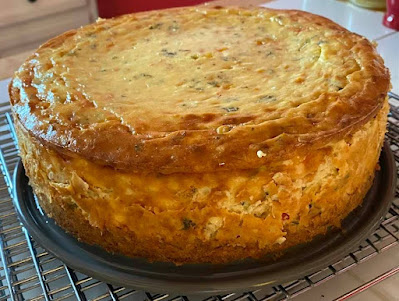Savory, Sweet Crab Cheesecake
The first time I had crab cheesecake was at GaidosRestaurant in Galveston, TX, which has a beautiful view of the Gulf Coast. It
was amazing – the view and the meal.
This is not that recipe.
It is one I
cobbled together from several recipes and it is as close to that amazing crab
cheesecake as I can make it without the actual Gaidos recipe in front of me.
It’s an experiment and, based on the feedback I’ve gotten, it’s pretty darn
good.
I will say this at the beginning and I’ll repeat it several times: It’s really, really important to make this crab cheesecake the day before you need it because it needs to stay in the refrigerator for 24 hours before it is served. The taste will be fine. If you don’t refrigerate it well, the consistency will be like a quiche. You want the consistency to be like cheesecake. Refrigerating it for 24 hours (or, at the very least, 4) will guarantee that.
This can be used as an appetizer, or part of a cheese platter, or as the main course with a side salad, with or without tomatoes, with a light dressing.
Prep: 20 – 30 minutes for prep
Oven temp: 325 F.
Cook time: 1 hour and 10 minutes to cook.
Equipment: One small and one large bowl, a 9-inch spring form pan, large whisk, a few spatulas, and a large sheet pan.
Ingredients:
For the filling
3 T EVOO (Extra virgin olive oil)
1 ½ cups finely diced sweet* peppers of various colors
½ cup finely diced sweet Vidalia onion
1 pinch salt
Garlic (I used a whole entire bulb), crushed or diced
4 large eggs
¼ cup all-purpose flour
1 ½ tsp. kosher salt, or to taste
½ tsp. freshly ground black pepper, or to taste
1 pinch cayenne pepper, or to taste
(I also added 2 T Old Bay Seasoning)
1 T white sugar
1 cup crème fraiche (or sour cream), but crème fraiche adds a lovely nutty taste)
3 (8-oz) packages cream cheese, at room temp. (Note: temp is very important)
½ cup grated Parmigiano-Reggiano cheese
3 T chopped parsley
1 pound lump crabmeat.
For the Herb Cracker Crust
4 ¼ ounces plain crackers, finely crushed by hand
¼ tsp. Italian seasoning
4 T (half a stick) melted butter
Directions
Preheat the oven to 325 F (165 Celsius).
Generously butter a 9-inch spring form pan
Start the filling: Heat olive oil in a pan over medium-high heat. Sauté peppers and onions with a large pinch of salt until onions just start to turn translucent, about 5 minutes. Stir in garlic and cook for 2 more minutes. Turn off heat and allow to cool to room temperature.
While the pepper mixture is cooling, prepare the crust: In a small bowl, combine crushed cracker crumbs, dried Italian herbs, and melted butter in a mixing bowl. Stir until the crumbs are coated.
Note: I crushed the crackers with my hands; not to worry if they don’t look like breadcrumbs or finely crushed graham cracker crumbs for a regular cheesecake. However, you may use Italian seasoned breadcrumbs in place of the crackers.
Transfer the buttered crumbs into the prepared (heavily buttered) spring form pan and press down into an even layer. Set aside until needed.
Continue the filling: Combine eggs, flour, kosher, salt,
black pepper, cayenne pepper, Old Bay seasoning, and sugar in a large mixing
bowl and whisk until smooth. Add the crème fraiche (or sour cream), cream
cheese, and the Parmigiano-Reggiano cheese, and mix until smooth. Stir in the
parsley and cooled pepper mixture until evenly combined. Gently fold in the crab meat until well dispersed.
Note: Please make sure the cream cheese is at room temperature. If not, be prepared to be stirring this sucker for the next hour. No joke.
Transfer cheese mixture into the prepared spring form pan. Tap the pan gently to settle the contents and place on a baking sheet. The pan will be quite full.
Cheesecake should be thoroughly chilled in the refrigerator before serving, at least 4 hours but best if 24 hours. This cheesecake can be served at room temperature but it will not have the classic smooth, firm cheesecake texture, and will be more like a very light cheese quiche – which is fine, I suppose, but it's a completely different meal.
Note: You can use hot peppers instead of sweet or a combination of both. I used water crackers for this but any cracker but a sweet cracker will do. Or, you may use Italian seasoned breadcrumbs.
I much prefer crème fraiche for its nutty flavor but sour crème works just as well.
It’s really important to finely dice the peppers, onion and garlic. You want the peppers tiny and colorful.
So, I’m told that this can be made without crab but used with crumbled cooked pork and/or bacon and eliminating the Old Bay seasoning and substituting, instead, sherry, but I can’t attest to it.
I’m also told this is delicious with chopped shrimp in place of the crab, with either Old Bay or sherry, but I can’t attest to it.
Some recipes I saw recommended serving this with cocktail
sauce. I think it’s totally unnecessary.
You can also make this vegetarian, using just vegetables and eliminating any shellfish or meat.
Enjoy!





